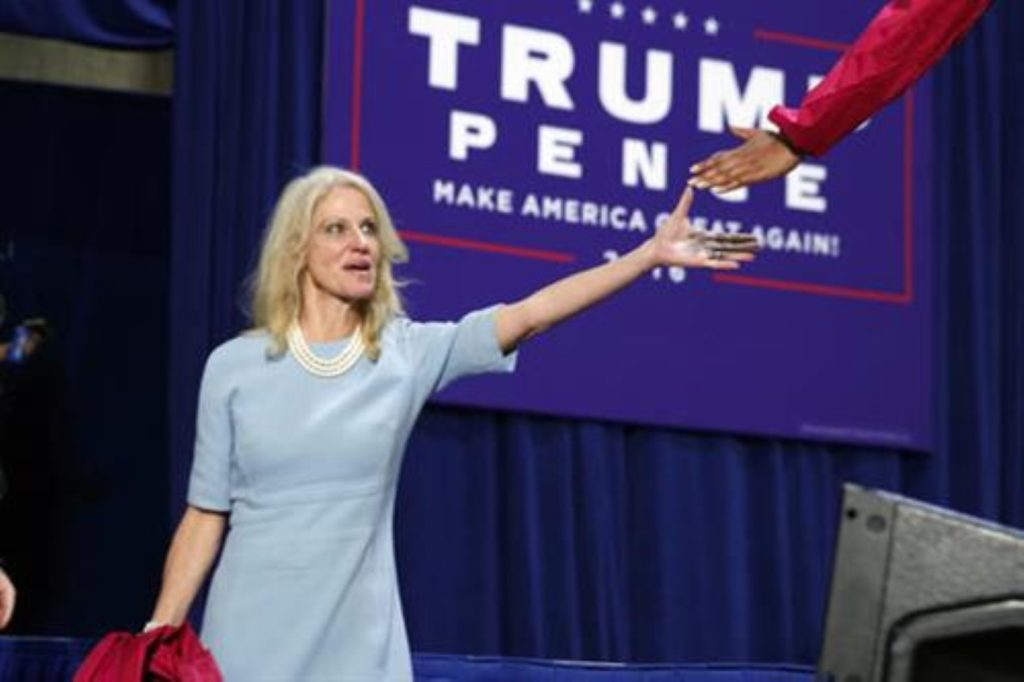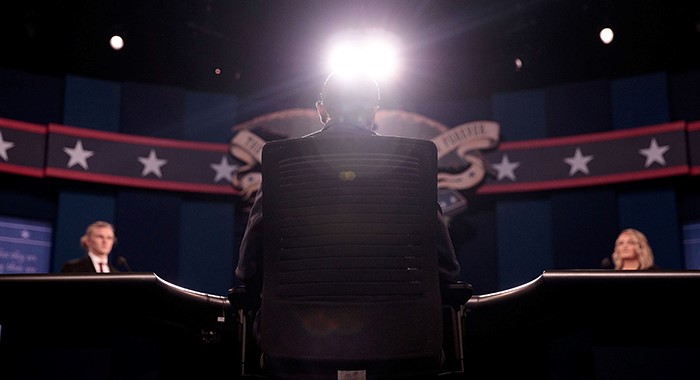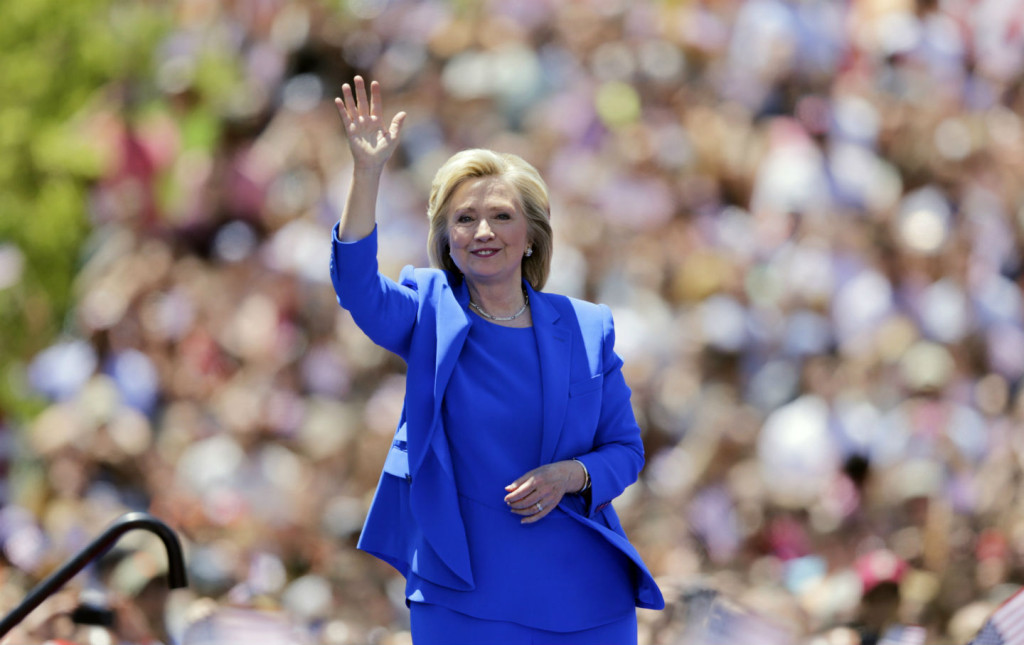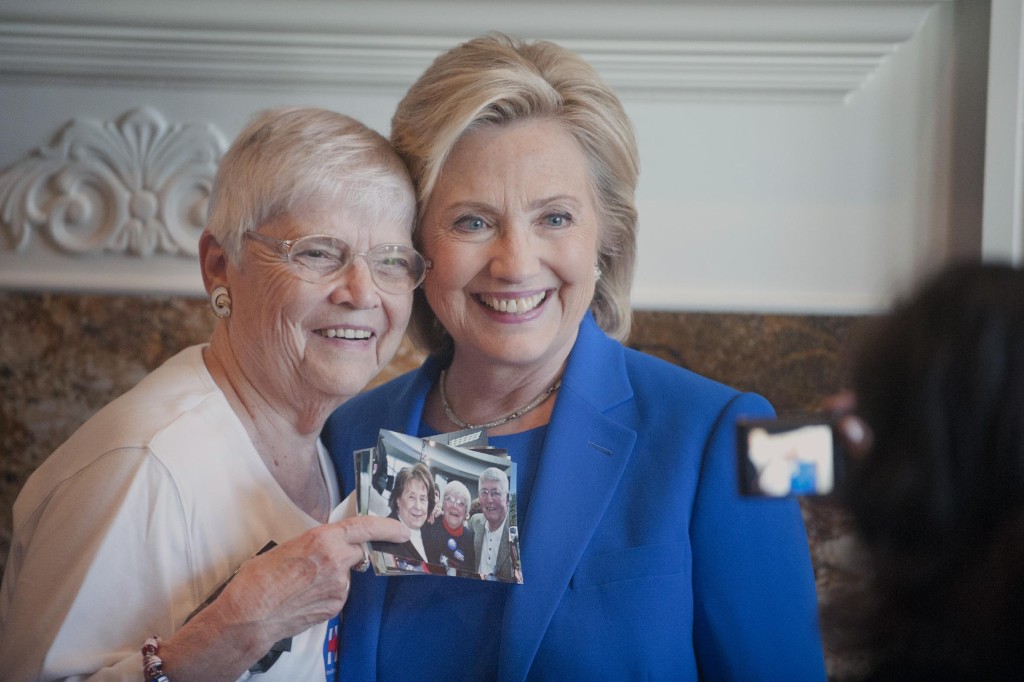Donald Trump team says ‘we are behind’ but can still win the race

Donald Trump‘s campaign bluntly acknowledged Sunday that the real estate mogul is trailing Hillary Clinton as the presidential race hurtles toward a close, but insisted he still has a viable path to win the White House. With barely two weeks left and early voting underway in most of the U.S., Trump’s team said “the race is not over” and pledged to keep campaigning hard — even in states like Virginia and Pennsylvania that polls show are now trending Clinton’s way. Campaign manager Kellyanne Conway laid out a path to the requisite 270 electoral votes that goes through make-or-break states Florida, Iowa, North Carolina and Ohio. “We are behind. She has some advantages,” Conway said Sunday. Yet she argued that Clinton’s advantages — like a slew of bold-name Democrats campaigning for her — belied her lack of true support. “The current president and first lady, vice president, all are much more popular than she can hope to be.” Added Republican National Committee Chairman Reince Priebus: “We expect to win.” Yet even as Clinton appeared to be strengthening her lead, her campaign was careful not to declare premature victory. “We don’t want to get ahead of our skis here,” said Clinton campaign manager Robby Mook. He said the “battleground states” where both candidates are campaigning hardest “are called that for a reason.” As part of his closing message, Trump was laying out an ambitious agenda for his first 100 days as president. Yet he undermined his own attempt to strike a high-minded tone on policy issues when he announced in the same speech that he planned to sue the numerous women who have accused him of groping and other unwanted sexual behavior. “All of these liars will be sued once the election is over,” Trump said Saturday during an event near the Civil War battlefield of Gettysburg. He added: “I look so forward to doing that.” Asked about Trump’s remarks, Clinton told reporters between rallies Saturday in Pittsburgh and Philadelphia that she was done responding to what her Republican opponent is saying as Election Day nears and would instead focus on helping elect other Democrats. A day earlier, Clinton attacked Pennsylvania’s Republican senator, Pat Toomey, saying in Pittsburgh that he has refused to “stand up” to Trump as she praised his Democratic challenger, Katie McGinty. Noting Trump’s comments about Mexican immigrants and his attacks on a Muslim-American military family, she said of Toomey: “If he doesn’t have the courage to stand up to Donald Trump after all of this, then can you be sure that he will stand up for you when it counts?” Clinton rejected Trump’s allegation, offered without evidence, that the dozen or so women who have come forward are being prompted by her campaign or the Democratic National Committee. The accusers emerged after the former reality TV star boasted of kissing women and groping their genitals without their consent. “These accusations are not coming from our campaign,” Mook said. On Saturday, an adult film actress said the billionaire kissed her and two other women on the lips “without asking for permission” when they met him after a golf tournament in 2006. Trump has denied that all the other allegations, while insisting some of the women weren’t attractive enough for him to want to pursue. “He’s been waterboarded by these issues,” said former Arizona Gov. Jan Brewer, a Trump supporter, lamenting the “oppression” of her candidate in the media. Though mostly a recap of policies he’s proposed before, Trump’s speech included a few new elements, such as a freeze on hiring new federal workers and a two-year mandatory minimum sentence for immigrants who re-enter the U.S. illegally after being deported a first time. In a pledge sure to raise eyebrows on Wall Street, he said he’d block a potential merger between AT&T and media conglomerate Time Warner. Throughout the GOP primary, Trump was criticized for shying away from detailed policy proposals. But his speech, which aides said would form the core of his closing argument to voters, underscored how the billionaire has gradually compiled a broad — if sometimes vague — policy portfolio that straddles conservative, isolationist and populist orthodoxies. Mook and Brewer spoke on CNN’s “State of the Union” and Priebus on CBS’ “Face the Nation.” Conway spoke on “Fox News Sunday” and on NBC’s “Meet the Press.” Republished with permission of the Associated Press.
Debate Night: Hillary Clinton, Donald Trump set for high-stakes showdown

After months of tangling from afar, Hillary Clinton and Donald Trump will confront each other face-to-face for the first time in Monday night’s presidential debate, laying out for voters their vastly different visions for America’s future. The high-stakes showdown — the first of three presidential debates — comes as both candidates are viewed negatively by large numbers of Americans, with Democrat Clinton facing questions about her trustworthiness and Republican Trump struggling to convince many voters that he has the temperament and policy depth to be president. Interest in the presidential race has been intense, and the campaigns are expecting a record-breaking audience to watch the 90-minute televised debate at suburban New York’s Hofstra University. Clinton, a former senator and secretary of state, is banking on voters seeing her as a steady hand who can build on the record of President Barack Obama, whose popularity is rising as he winds down his second term in office. She’s called for expanding Obama’s executive orders if Congress won’t pass legislation to overhaul the nation’s immigration system and for broader gun control measures. Overseas, she’s called for a no-fly zone in Syria but has vowed to keep the military out of a large-scale ground war to defeat the Islamic State group. For Clinton, victory in November largely hinges on rallying the same young and diverse coalition that elected Obama but has yet to fully embrace her. Her campaign manager, Robby Mook, told “CBS This Morning” on Monday that she fully understood she still needs to earn voters’ trust. “When she’s had the opportunity to talk about not just what her plans are to make a difference in people’s lives, but how this campaign is really part of a lifelong mission to fight for kids and families, she’s done really well,” Mook said. Trump has tapped into deep anxieties among some Americans, particularly white, working-class voters who feel left behind in a changing economy and diversifying nation. While the real estate mogul lacks the experience Americans have traditionally sought in a commander in chief, he’s banking on frustration with career politicians and disdain for Clinton to push him over the top on Election Day. Trump’s campaign manager, Kellyanne Conway, said Monday that she saw her candidate as “ready for tonight.” That natural connective tissue he has with people, and his ability to communicate directly with people through the noise — or through the silence, whatever the case may be — will be on display tonight,” Conway said. The centerpiece of Trump’s campaign has been a push for restrictive immigration measures, including a physical wall along the U.S.-Mexico border and an early proposal to temporarily bar foreign Muslims from coming to the U.S. But he’s been less detailed about other ideas, including his plan for stamping out the Islamic State group in the Middle East, and Conway suggested he’d be similarly coy in Monday’s debate. “You will get his view of how best to defeat the enemy — without telling ISIS specifically what it’s going to be,” Conway said on MSNBC, using another acronym for IS. Clinton’s camp is worried that Trump will be held to a different standard in the debate and is particularly concerned that the notoriously hot-headed businessman will be rewarded for simply keeping his cool. Clinton backers have been publicly pushing moderator Lester Holt of NBC News to fact-check Trump if he tries to mislead voters about his record and past statements. “We also are concerned that Trump is going to continue to lie,” Mook said. The billionaire’s advisers have indeed been urging him to keep calm on stage, mindful of voters’ concerns about his temperament. On Saturday, Trump showed a glimpse of the traits his advisers want to keep in check, announcing on Twitter that he might extend a debate invitation to Gennifer Flowers, a woman who had an affair with Clinton’s husband, former President Bill Clinton. Trump’s campaign said the candidate was responding to Clinton’s decision to invite businessman and Trump critic Mark Cuban to the debate, and that Trump floated the invitation to remind people of his ability to punch back. By Sunday, his campaign said Flowers would not be attending. Trump was often a commanding presence in the Republican primary debates, launching biting personal attacks on his rivals. But at times, he appeared to fade into the background, especially during more technical policy discussions — something he’ll be unable to do with just two candidates on stage. Clinton has debated more than 30 times at the presidential level, including several one-on-one contests against Obama in 2008 and Vermont Sen. Bernie Sanders in 2016. But Monday’s contest will be her first presidential debate against a candidate from the opposing party. Republished with permission of the Associated Press.
Primary odd couple pushes to unite Democratic party

It seemed like a surprising party of two. There was Robby Mook, Hillary Clinton‘s top campaign aide, known for his calm temperament and fiercely disciplined ways, and Jeff Weaver, a combative political fighter often called Bernie Sanders‘ alter ego, sharing a Friday night dinner at The Farmhouse Tap & Grill in Burlington, Vermont. But over the long months of a frequently contentious primary, the two rival Democratic campaign managers struck up an unusually friendly relationship, founded on exhaustion, goofy jokes and a shared affection for their home state of Vermont. They talk almost daily, text frequently and email often. Now, as Sanders lingers in the presidential race, refusing to concede the nomination to Clinton even as he says he’ll vote for her on Election Day, the competing campaign managers have become a powerful political odd couple, responsible for engineering a graceful conclusion to a hard-fought Democratic contest. “I’ve really come to respect him,” Mook said. “There were some tense moments, but he was always honest, straightforward and very easy to work with.” Weaver is equally effusive in his praise. “I think he’s the kind of guy who is doing what he does for the right reasons,” Weaver said about Mook. “He believes in the cause and he believes in making the world a better place.” After Clinton and Sanders met at Washington hotel this month, their managers stayed until almost midnight, attempting to hammer out an agreement that would give Sanders some of the changes he wants to make to the party’s platform. During his Friday trip to Vermont, Mook made sure to meet with Sanders supporters. Some of the communication hints at far closer cooperation to come. The two camps are increasingly comparing notes on how best to attack presumptive GOP nominee Donald Trump. Clinton’s campaign and state Democratic parties have hired some Sanders staffers, and there is chatter about joint events to come. Both Mook and Weaver share a slightly silly sense of humor. Mook, 35, regales his fiercely loyal band of young operatives, known as the Mook Mafia, with impressions, including spot-on impersonations of Bill Clinton and Sanders. Weaver, 50, who owns and operated a Falls Church, Virginia, comic book and gaming store before taking the helm of Sanders’ campaign, made up gag business cards at the start of the campaign describing himself as the “comic book king.” “His Bill Clinton is pretty good,” Weaver said of Mook. “It’s not only the voice, but it’s the subject matter.” But their back-channel negotiations are nothing but serious. While Clinton has largely unified Democratic leadership around her bid, she’s struggling to win over the young and liberal voters who supported Sanders, a Vermont senator. Sanders is pushing for ways of addressing key economic issues in the Democratic platform, including trade, providing free college tuition and expanding Medicare and Social Security. “Right now, what we are doing is trying to say to the Clinton campaign, stand up, be bolder than you have been. And then many of those voters, in fact, may come on board,” Sanders told CNN’s “State of the Union” on Sunday. He also wants procedural changes, such as allowing independents to participate in primaries and curtailing the role of superdelegates — the party leaders who help determine the party’s nominee. On Friday, Sanders told MSNBC that he would vote for the former secretary of state. But he shied away from offering a formal endorsement or urging his supporters to back her. Instead, he’s kicked off a new phase of his “political revolution,” campaigning on behalf of like-minded Democrats who are running for Congress or local office. To close that gap, the candidates may rely on the personal rapport between their two top aides, a relationship helped along by formative years in Vermont politics. Weaver was raised in a rural, northern Vermont town. Mook, the son of a Dartmouth professor, grew up in Norwich, near the New Hampshire border. As a 20-year-old Boston University student, Weaver drove Sanders around the small state during Sanders’ unsuccessful campaign for governor. Mook’s first campaign memory: going to the dump to get petition signatures and distribute literature. While they knew of each other, the first time they met in person was in October, at the Iowa Democratic Party’s Jefferson-Jackson Dinner, a key stop for presidential candidates. Wearing matching outfits of khakis, blue blazers and Johnston & Murphy brown shoes, they posed for photos with their legs propped up on a security barrier. “His shoes were in better condition,” joked Mook. In New Hampshire, they were subjected to a series of interviews about each other’s campaigns — while sitting kitty-corner. The experience was remarkably friendly, Weaver recalled, allowing them to commiserate over the lack of sleep and endless travel that is part of a presidential campaign. After that, the conversation slowly expanded. Today, their relationship has grown far closer than that of their bosses. Though Clinton and Sanders have known each other since she came to Washington as first lady in 1993, they rarely communicate, say aides. Former President Bill Clinton, according to aides, was particularly frustrated by Sanders’ ability to cast himself as above politics-as-usual while firing off what he considered to be misleading attacks on Clinton’s White House legacy. For Weaver, his focus remains on ensuring that Sanders and his supporters are represented in the party and the platform that will be voted on at the Philadelphia convention. “It obviously is important that the secretary during the general election speaks to the aspirations of that 13 million people who voted for Bernie Sanders,” Weaver said. “It’s important those people be heard — not just feel like they’ve been heard — but be heard.” Republished with permission of The Associated Press.
Hillary Clinton campaign reports $37M in primary money in Q4

Hillary Clinton‘s presidential campaign said Friday it raised $37 million in the past three months and more than $112 million in all of 2015 to support her bid for the Democratic nomination. Clinton’s team also said she raised $18 million for the Democratic National Committee and state Democratic parties nationwide in the fourth quarter, putting her total haul for the past three months at $55 million. The fundraising for the DNC and state parties is aimed at helping Clinton in the general election should she win her party’s nomination. Clinton’s fourth-quarter amount exceeded the $28 million she raised in the three months that ended Sept. 30. Heading into the January sprint toward the leadoff Iowa caucuses on Feb. 1, Clinton’s campaign said it has nearly $38 million in cash on hand. “Thanks to the hundreds of thousands of Americans who have joined together and powered this historic campaign, we are now heading into Iowa and New Hampshire with the resources we need to be successful,” campaign manager Robby Mook said in a statement. Clinton’s campaign had set a goal of $100 million for the primary in 2015. Clinton’s chief rival, Bernie Sanders, did not immediately report his fundraising totals for the quarter that ended on Dec. 31. But the Vermont senator has collected more than 2 million individual contributions and raised money online at a vigorous pace, taking in about $40 million through the end of September and ending that period with about $27 million in the bank. His campaign has noted that most of its donors have given in small increments — about $20 to $30 apiece — allowing Sanders to return to them repeatedly. While Clinton has built a steady lead in national polls, Sanders remains competitive against her in Iowa and holds a slight advantage in New Hampshire, his New England neighbor which holds its primary on Feb. 9. The third major Democrat in the race, former Maryland Gov. Martin O’Malley, has lagged behind Clinton and Sanders in fundraising and polls. The Clinton campaign said more than 60 percent of its donors in 2015 were women. It also said 94 percent of the donations it received in the fourth quarter came in increments of $100 or less, but it did not say what percentage of its overall fundraising total came from such small-dollar donors. The campaign spent about $75 million in 2015, building large organizations in the early voting states and a data-driven operation to connect with voters. Helped by several fundraisers headlined by former President Bill Clinton, most of Hillary Clinton’s money came via traditional fundraising events, where the price of entry was often the legal maximum donation of $2,700 for the primary. The presidential candidates have until Jan. 31 to report such details to federal regulators. Clinton isn’t alone in releasing some selective details ahead of that schedule. Earlier this week, Republican Texas Sen. Ted Cruz‘s campaign said it had raised nearly $20 million in the fourth quarter. Cruz’s campaign said in a memo to supporters that he will finish the year having raised more than $45 million, but it did not disclose how much the campaign has spent or how much cash it has on hand.
Hillary Clinton looks to build organizational edge in Iowa

Seeking an army of volunteers, Hillary Rodham Clinton is trying to build an organizational edge in Iowa as some of her lesser-known Democratic rivals clamor for attention in the state that tripped up her first presidential campaign. Clinton flew to Iowa on Saturday night after her high-profile New York kickoff, telling supporters at a Sioux City house party that her campaign would seek to rally the country around an agenda for the future. “Everybody has a role to play,” Clinton said, urging supporters to sign up to join her campaign. Despite her dominant position in the Democratic primaries, Clinton’s allies are trying to erase the memories of her third-place finish in Iowa’s 2008 caucuses, the contest that fueled Barack Obama‘s rise to the White House. The former secretary of state’s Iowa event was streamed online to more than 600 similar gatherings around the country, covering every congressional district in an effort to add volunteers to the campaign’s roster. Clinton planned to address supporters at the Iowa State Fairgrounds in Des Moines on Sunday and then travel to the Mississippi River city of Burlington. But she had company in the state: One of her main Democratic challengers, Vermont Sen. Bernie Sanders, was campaigning across the state during the weekend. Former Virginia Sen. Jim Webb, who is exploring a potential Democratic bid, was holding events in Iowa on Sunday. During her New York speech, Clinton remained silent on some issues of critical importance to the Democratic base, most notably a Pacific Rim trade pact backed by Obama but opposed by organized labor, liberals and others who say it will cost the U.S. jobs. The agreement has not been finalized or submitted to Congress. Sanders, who has opposed the trade deal, again questioned Clinton’s refusal to say where she stood on the Trans-Pacific Partnership. “Most Democrats in the Congress are against it. But I don’t understand how you don’t have a position on this issue,” he said Saturday in Des Moines, where he opened a new campaign office. “You can’t take a position on a trade bill that you can’t see,” Clinton’s campaign manager, Robby Mook, told CBS’ “Face the Nation” on Sunday. Clinton and her advisers are not saying whether she supports legislation in Congress to give the president special negotiation authority on trade deals. In New Hampshire, former Maryland Gov. Martin O’Malley pointed to his executive experience while his campaign noted to supporters in an email that Clinton “didn’t say that she would take any substantive actions to hold Wall Street CEOs accountable for reckless behavior. Nor did she weigh in on the secretive TPP deal that could depress American wages and cost American jobs.” In New York, Clinton offered herself as a fierce advocate for those still struggling from the Great Recession. “I think you know by now that I’ve been called many things by many people,” Clinton said to cheers and laughter from the crowd of roughly 5,500 gathering on New York’s Roosevelt Island in the East River. “Quitter is not one of them.” Hours later in Iowa, Clinton added, “I don’t believe we should ever quit on our country.” Republished with permission of the Associated Press.


